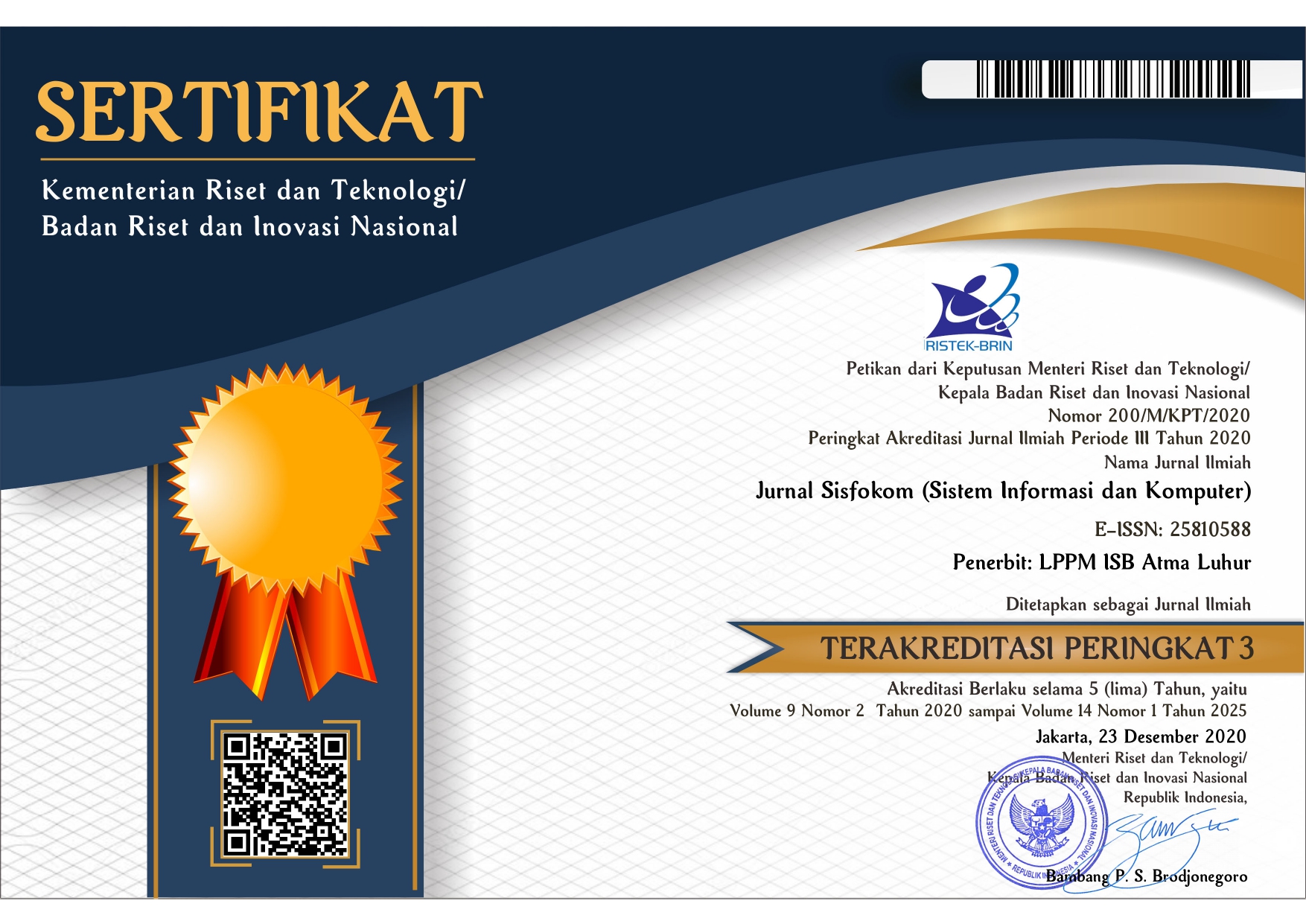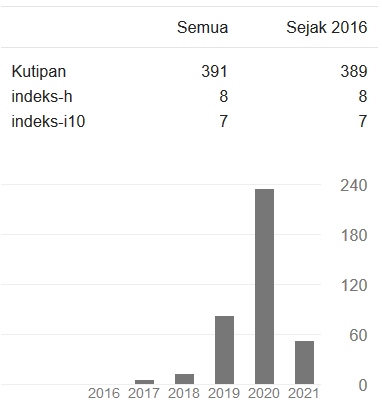Analysis of Public Sentiment Towards LGBT on Twitter Social Media using Naïve Bayes Method
DOI:
https://doi.org/10.32736/sisfokom.v14i3.2400Keywords:
Sentiment Analysis, LGBT, Twitter, Naïve bayesAbstract
The advancement of information technology and the widespread use of social media have provided a platform for individuals to express their views on various social issues, including those related to Lesbian, Gay, Bisexual, and Transgender (LGBT) topics. This study aims to assess public sentiment towards LGBT issues on Twitter by employing the Naïve Bayes classification algorithm. Relevant tweets were collected through web scraping based on specific LGBT-related keywords within a defined time frame. The collected data underwent several preprocessing stages, including data cleaning, tokenization, stopword removal, and stemming. The processed data were then categorized into three sentiment classes: positive, negative, and neutral. Naïve Bayes was chosen for its effectiveness and efficiency in handling large-scale textual data. The analysis revealed that negative sentiment toward LGBT issues was predominant, although a considerable portion of tweets expressed neutral and positive sentiments. These findings offer valuable insights for policymakers, social activists, and academics in understanding public perception and formulating more effective communication strategies related to LGBT discourse in Indonesia. The classification model achieved an accuracy of 57%, precision of 52%, recall of 100%, and an F1-score of 68%. While the Naïve Bayes approach proved capable in sentiment classification, the model's accuracy could be further enhanced through improved data preparation or the application of more advanced algorithms.References
R. Palupi, M. H. Rahmansyah, G. M. Arasta, and G. Irhamdhika, “Isu LGBT Dalam Bingkai Media Online (Analisis Framing Robert Entman Pada Pemberitaan RKUHP LGBT Pada Tempo. co Dan BBBCIndonesia. com),” Jurnal Media Penyiaran, vol. 2, no. 2, pp. 148–156, 2022.
E. Andina, “Faktor psikososial dalam interaksi masyarakat dengan gerakan lgbt di indonesia,” Aspirasi: Jurnal Masalah-masalah Sosial, vol. 7, no. 2, pp. 173–185, 2019.
S. Amalia, “Kelompok LGBT Indonesia Ikut Serta dalam Paris Pride,” 2019.
M. Sholihin, “Polisi Tak Beri Izin Kegiatan LGBT Berkedok Gathering di Puncak Bogor.,” vol. 1, 2022.
W. Yulita, E. D. Nugroho, and M. H. Algifari, “Analisis sentimen terhadap opini masyarakat tentang vaksin covid-19 menggunakan algoritma naïve bayes classifier,” Jurnal Data Mining dan Sistem Informasi, vol. 2, no. 2, pp. 1–9, 2021.
W. Zhang and F. Gao, “An improvement to naive bayes for text classification,” Procedia Eng, vol. 15, pp. 2160–2164, 2011.
N. Nurdin, M. Suhendri, Y. Afrilia, and R. Rizal, “Klasifikasi Karya Ilmiah (Tugas Akhir) Mahasiswa Menggunakan Metode Naive Bayes Classifier (NBC),” SISTEMASI: Jurnal Sistem Informasi, vol. 10, no. 2, pp. 268–279, 2021.
R. Rizal, M. Fikry, and A. Helmina, “Opinion Mining About Parfum on E-Commerce Bukalapak. Com Using the Naïve Bayes Algorithm,” JITK (Jurnal Ilmu Pengetahuan dan Teknologi Komputer), vol. 6, no. 1, pp. 107–114, 2020.
R. Tjut Adek and S. Nasution, “Tweet Clustering in Indonesian Language Twitter Social Media using Naive Bayes Classifier Method,” Eurasian Journal of Analytical Chemistry (Abbrev. Eurasian J Anal Chem. or EJAC), vol. 13, no. 6, pp. 277–284, 2018.
R. Kosasih and A. Alberto, “Sentiment analysis of game product on shopee using the TF-IDF method and naive bayes classifier,” ILKOM Jurnal Ilmiah, vol. 13, no. 2, pp. 101–109, 2021.
A. Karami, M. Lundy, F. Webb, H. R. Boyajieff, M. Zhu, and D. Lee, “Automatic Categorization of LGBT User Profiles on Twitter with Machine Learning,” Electronics (Basel), vol. 10, no. 15, p. 1822, 2021.
V. A. Fitri, R. Andreswari, and M. A. Hasibuan, “Sentiment analysis of social media Twitter with case of Anti-LGBT campaign in Indonesia using Naïve Bayes, decision tree, and random forest algorithm,” Procedia Comput Sci, vol. 161, pp. 765–772, 2019.
L. A. Fudholi, N. Rahaningsih, and R. D. Dana, “Sentimen Analisis Perilaku Penggemar Coldplay Di Media Sosial Twitter Menggunakan Metode Naive Bayes,” JATI (Jurnal Mahasiswa Teknik Informatika), vol. 8, no. 3, pp. 4150–4159, 2024.
H. Hermanto and A. Noviriandini, “Analisa Sentimen Terhadap Belajar Online Pada Masa Covid-19 Menggunakan Algoritma Support Vector Machine Berbasis Particle Sarm Optimization,” Jurnal Informatika Kaputama (JIK), vol. 5, no. 1, pp. 129–136, 2021.
L. Hickman, S. Thapa, L. Tay, M. Cao, and P. Srinivasan, “Text preprocessing for text mining in organizational research: Review and recommendations,” Organ Res Methods, vol. 25, no. 1, pp. 114–146, 2022.
H. Simorangkir and K. M. Lhaksmana, “Analisis Sentimen pada Twitter untuk Games Online Mobile Legends dan Arena of Valor dengan Metode Naïve Bayes Classifier,” eProceedings of Engineering, vol. 5, no. 3, 2018.
E. H. Muktafin, K. Kusrini, and E. T. Luthfi, “Analisis Sentimen pada Ulasan Pembelian Produk di Marketplace Shopee Menggunakan Pendekatan Natural Language Processing,” Jurnal Eksplora Informatika, vol. 10, no. 1, pp. 32–42, 2020.
Downloads
Published
Issue
Section
License
Copyright (c) 2025 Yudhi Franata, Rizal, Rizki Suwanda

This work is licensed under a Creative Commons Attribution 4.0 International License.
The copyright of the article that accepted for publication shall be assigned to Jurnal Sisfokom (Sistem Informasi dan Komputer) and LPPM ISB Atma Luhur as the publisher of the journal. Copyright includes the right to reproduce and deliver the article in all form and media, including reprints, photographs, microfilms, and any other similar reproductions, as well as translations.
Jurnal Sisfokom (Sistem Informasi dan Komputer), LPPM ISB Atma Luhur, and the Editors make every effort to ensure that no wrong or misleading data, opinions or statements be published in the journal. In any way, the contents of the articles and advertisements published in Jurnal Sisfokom (Sistem Informasi dan Komputer) are the sole and exclusive responsibility of their respective authors.
Jurnal Sisfokom (Sistem Informasi dan Komputer) has full publishing rights to the published articles. Authors are allowed to distribute articles that have been published by sharing the link or DOI of the article. Authors are allowed to use their articles for legal purposes deemed necessary without the written permission of the journal with the initial publication notification from the Jurnal Sisfokom (Sistem Informasi dan Komputer).
The Copyright Transfer Form can be downloaded [Copyright Transfer Form Jurnal Sisfokom (Sistem Informasi dan Komputer).
This agreement is to be signed by at least one of the authors who have obtained the assent of the co-author(s). After submission of this agreement signed by the corresponding author, changes of authorship or in the order of the authors listed will not be accepted. The copyright form should be signed originally, and send it to the Editorial in the form of scanned document to sisfokom@atmaluhur.ac.id.









